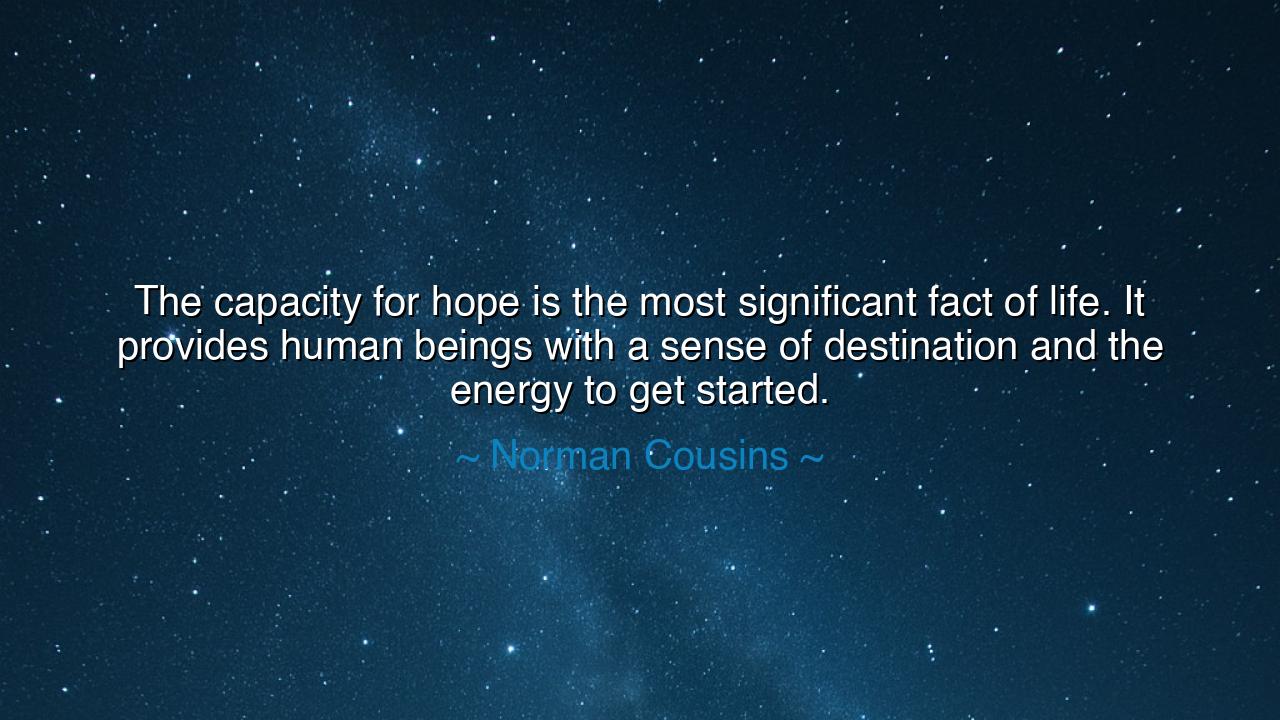
The capacity for hope is the most significant fact of life. It
The capacity for hope is the most significant fact of life. It provides human beings with a sense of destination and the energy to get started.






In the luminous and enduring words of Norman Cousins, philosopher of healing and champion of the human spirit, there resounds a truth older than kingdoms and deeper than science: “The capacity for hope is the most significant fact of life. It provides human beings with a sense of destination and the energy to get started.” This is no idle reflection, but the wisdom of one who saw both the frailty and the strength of humanity. Cousins, who survived great illness and despair, knew that hope is not a fragile emotion but the engine of life itself — the fire that keeps the heart beating when reason falters and the path ahead disappears in shadow.
To call hope the most significant fact of life is to declare it the foundation upon which all progress, healing, and endurance rest. Without hope, the body weakens, the mind surrenders, and the will grows silent. But with hope — even a flicker of it — the impossible becomes possible. Hope gives us direction, a sense of destination, as Cousins wrote. It points the weary traveler toward a dawn not yet seen. It says to the broken, “Rise.” It says to the fearful, “Try again.” It whispers to the sick and the despairing, “You are not finished yet.” Cousins understood this not as a poet’s fancy, but as a living truth born of experience and observation.
For Norman Cousins was a man who proved his own philosophy through suffering. When stricken with a crippling illness that doctors believed incurable, he refused to yield to despair. Instead, he prescribed himself laughter, optimism, and hope, believing that the mind’s faith could heal what medicine could not. Against all odds, his health improved — and his recovery became a symbol of the power of the human spirit to will itself toward life. From this, he taught the world that hope is not denial; it is defiance — a rebellion against pain, entropy, and despair. In the presence of hope, even the body remembers its purpose: to heal, to endure, to continue.
History, too, bears witness to Cousins’s truth. Consider Viktor Frankl, the psychologist who endured the horrors of the Nazi concentration camps. Surrounded by death, he observed that those who survived were not always the strongest in body, but those who still had hope — a reason to live, a vision of reunion, a sense of destiny beyond the barbed wire. When all else was taken, hope remained the final possession, the inner flame that no captor could extinguish. Frankl would later write that “life is never made unbearable by circumstances, but only by lack of meaning and purpose” — and hope is the bridge to both.
To have hope, then, is to possess the energy to begin — to face the uncertain with courage. Hope is not passive; it is the first movement of creation. Every discovery, every invention, every revolution has been born from it. When the Wright brothers dreamed of flight, when Gandhi believed in peace, when Martin Luther King Jr. envisioned justice — all were guided by hope. It is the unseen current that drives all human endeavor. And though it may seem soft, it is the most enduring force in history, for armies fade and empires crumble, but the dream of a better tomorrow remains eternal.
Yet hope must be tended like a sacred flame. It cannot live in cynicism, nor thrive in indifference. It grows through faith, effort, and vision. Cousins’s wisdom reminds us that to nurture hope, one must act — to begin even when success is uncertain, to love even when the world feels unlovable, to believe in light even when surrounded by night. The soul that hopes does not wait for miracles; it creates them, one small act at a time. For hope is both destination and journey — both the dream and the hand that builds it.
Let this be the lesson for all who walk the path of life: guard your hope as you would your breath, for it is the breath of your soul. When fear rises, remember that hope is stronger. When exhaustion weighs upon you, remember that hope renews. Do not let the cynics steal it from you, for they are blind to the truth that hope is not illusion — it is power. And when you find another whose hope has dimmed, share yours with them, for light shared is light multiplied.
And so, my children, remember the wisdom of Norman Cousins: that hope is not merely a comfort, but the source of all human greatness. It is the spark that ignites action, the compass that points the heart toward meaning, the silent promise that life still has something more to give. Wherever you go, carry it with you — for as long as you have hope, you will never truly be lost.






AAdministratorAdministrator
Welcome, honored guests. Please leave a comment, we will respond soon